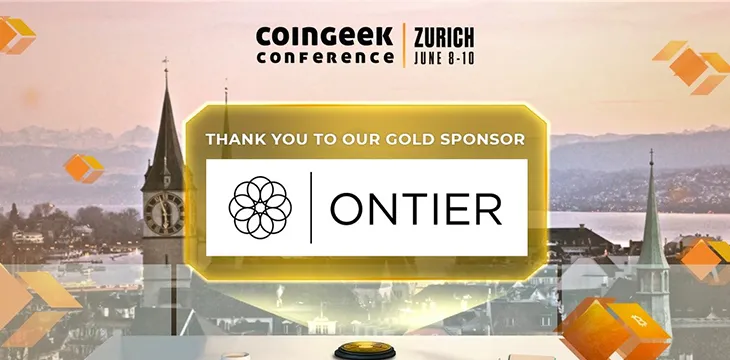|
Getting your Trinity Audio player ready...
|
Digital currencies and blockchain are the real deal in the Fintech industry today. It is not common to understand that digital currencies should be looked at as legal possessions, as famous as they may be. ONTIER U.K. Senior Associate Simon Cohen shares his insights on intellectual property rights, litigations, and the upcoming CoinGeek Conference in Zurich.
Can you give us a brief overview of what your firm does as well as the problem it aims to solve or the service it looks to provide?
Simon Cohen: ONTIER specializes in providing our clients with the commercially-driven legal advice they require to attain their goals. We act for clients on their corporate and commercial affairs, including civil disputes—both litigation and arbitration. One of our biggest growth areas and focuses is the legal and regulatory sphere as it impacts on blockchain, associated digital assets and products.
What type of clients does ONTIER work with?
Simon Cohen: We represent clients of every kind: multi-national corporations, private equity and venture capital firms, software developers, media corporations and High and Ultra High Net Worth Individuals. We service our client’s’ corporate and commercial needs and advise them on practically the full range of civil and commercial disputes, from breaches of contract to breaches of trust and fiduciary duties, shareholders’ rights, copyright and other intellectual property rights infringements, defamation and reputation management. Recently we have been at the forefront of the constantly developing legal and regulatory framework that governs the relationship between investors and online exchanges.
Bitcoin and blockchain are relatively new, so when did ONTIER start seeing digital currency-related cases fall on your radar?
Simon Cohen: The first few cases started coming in late 2018, and we have since seen a steady pace and increase in the number of inquiries for advice for both disputes and corporate and commercial matters. We’ve noticed a recurring theme of investors losing access to their digital assets (whether as a result of hacking or being the victim of scams) and instances where online exchanges have delisted digital assets like Bitcoin SV and have failed to reimburse their customers for at least the fiat value of those assets.
When the Bitcoin White Paper came out in 2008, there were no trusted third party intermediaries, including online exchanges such as Binance and others. That’s no longer the case. There are new online exchanges and trading platforms being set up every month. It’s clear to me that they operate, like banks, as trusted third party intermediaries for the clients and hold their customers’ assets to the credit of all their customers. They should be held to the same legal standards and be subject to the same legal and regulatory obligations as their more traditional counterparts. There should be legal consequences if exchanges and platforms improperly freeze or otherwise refuse to return these assets to their customers upon request and I would strongly encourage people to seek legal advice if they are affected in this way.
Can you speak about the copyright law and the precedent that Dr. Craig Wright’s case is setting?
Simon Cohen: I’m not able to go into much detail about Dr. Wright’s cases. What I can say is that he claims to be the author of, and owner of the copyright in, the Bitcoin White Paper and that various individuals and entities are infringing copyright by publishing the White Paper without his consent.
In terms of legal precedent, there is nothing novel about that. However, I think the bit that has caught the public’s attention is that parties involved are high profile corporations, controlled by various extremely well-known influential individuals, all of whom are asking the ultimate Bitcoin question: who is the author of that white paper? Who is the person behind the pseudonym ‘Satoshi Nakamoto’? Some say they know one way or another, while others say they want to see the proof. We, at ONTIER, are confident that Dr. Wright will be vindicated.
Is there anything you’re excited about Bitcoin right now?
Simon Cohen: Blockchain is still an emerging technology, and apps are increasing day by day. The law is always a bit slow to catch up with technical or social advancement. In recent years, common law jurisdictions such as England, Canada, New Zealand, the U.S., Australia, and Singapore have recognized that blockchain-linked digital assets are a form of property. The question that government and lawyers in those jurisdictions now need to focus on answering is what specific rights flow from and attach to these assets. ONTIER is a leading law firm in this sector and we are working to develop and clarify the legal and regulatory framework for these assets and to build global industry consensus in this regard.
The Internal Revenue Service of the U.S. announced in 2014 that digital currencies should be considered property. Can you elaborate on that?
Simon Cohen: Every country has its definition of legal property. It is hard to make sweeping statements, but from a language perspective, if blockchain-linked digital assets are recognized as property in the full legal sense of the word, many remedies and rights flow from that. We think most people will be concerned about inheritance laws because there is no clear guidance on what happens when digital currency / assets owners pass away and whether their heirs can inherit or otherwise retrieve those assets. If BSV and other digital assets are property (and we say they are), they should benefit from the same legal rights (and, yes, be subject to the same legal burdens) as other forms of property, including the ability to recover lost/stolen assets or to inherit them; it also means that they must be capable of being seized by law enforcement and should be subject to the appropriate tax regimes (including inheritance and capital gains tax).
An ongoing argument is whether the authorities should introduce new legislation if the current regulatory framework cannot capture blockchain and digital assets capabilities from a legal standpoint. In the U.K., exchanges and trading houses dealing with blockchain and digital assets are not subject to the regulatory requirements that banks and traders are, which leaves investors (the majority of whom are people of ordinary means) exposed when things go wrong. We would like to see some progress there.
What are you looking forward to the most about the conference being in Switzerland?
Simon Cohen: CoinGeek conferences are an incredible opportunity for all of us to get together with other like-minded people and companies and to learn about each other’s products and our innovations, and their potential for changing the way that we live and work and the way that we do business. There is a fantastically broad range of people and industries that converge and meet here.
CoinGeek conferences are a global, they are multi-generational. There will be people here who are speaking who have worked in technology and finance for decades, and at the same time, people who are just starting out. I think there’s going to be a lot of great products, a lot of great ideas coming out of Zurich this year, and also in future conferences as well.
Why did ONTIER decide to sponsor CoinGeek Zurich?
Simon Cohen: ONTIER is one of the leading law firms with expertise in advising on the legal and the regulatory issues which are connected with and arise from blockchain and its associated technology. We are at the forefront of developing the law as it relates to blockchain and blockchain-related products and assets, and we want to continue to be a market leader, we want to continue be the go-to firm for companies and individuals who are invested and who are otherwise involved in this sector. And to do that, we need to be where it’s at. And where it’s at is CoinGeek.
What is the core value of conferences for businesses and individuals?
Simon Cohen: A conference is an opportunity for entrepreneurs and investors to exchange ideas and to collaborate and create new ones. They come together to build different products by using the same BSV blockchain technology. The event gives attendees an insight into what is possible, and ONTIER, as one of the participants, reassures them of the same.
Do you have any presentations or speakers that you are looking forward to attending at the conference?
Simon Cohen: We always look forward to the fireside chats with Dr. Craig Wright and Jimmy Nguyen. We are also interested in the Blockchain Law & Policy discussion with Marcin Zarakowski. On a personal note, and given what the whole world has experienced this past year, and the triumph of the coronavirus vaccines by various pharmaceuticals, I’m also very interested in Phillip Runyan’s speech on how BSV blockchain can improve pharmaceutical research and development and supply chains.
If there was one takeaway that you want the audience to know after seeing you and your team at CoinGeek Zurich, what would it be?
Simon Cohen: The businesses (at the event) are passionate about the ideas they are developing and the products they are building now and in the future. We want to help them in the good times to build and realise their ideas, and should things ever go awry, we want them to know that we at ONTIER, are here to help them. We work hand in hand with our clients and pride ourselves on giving them the quality commercial legal advice that they need in order to meet their goals.
Check out the Blockchain Law & Policy panel session at the CoinGeek Conference in Zurich. The panel, moderated by Marcin Zarakowski of Bitcoin Association, will feature lawyers and legal experts including Tina Balzli, Attorney-at-Law, LL.M. (NYU), LL.M. (NUS); Dr. Thomas Dünser, Director of the Office for Financial Centre Innovation, Government of Liechtenstein; Pēteris Zilgalvis, J.D., Head of Unit, Digital Innovation and Blockchain DG CONNECT, European Commission; and Nino Landerer, Head of Capital Markets & Infrastructure Staatssekretariat für internationale Finanzfragen.
Register for free today to watch all the CoinGeek Conference speakers discuss how blockchain can ignite the power of data.

 04-29-2025
04-29-2025 





